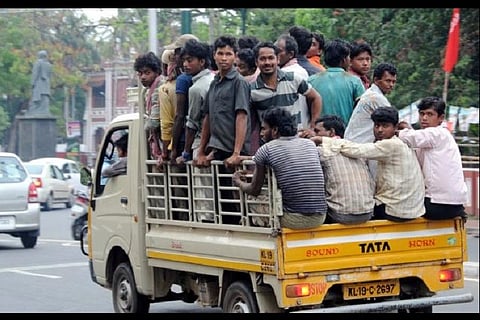

According to a circular issued by the Idukki District Police Chief, migrant labourers in the district will now be under CCTV surveillance in the labour camps in which they live.
In a meeting convened by the police with around 75 agents, contractors and company owners on Monday, DCP AV George issued a circular, which mandated registration of all migrant labourers and the monitoring of their activities through CCTV surveillance.
The circular also states that workers must provide a Police Clearance Certificate (PCC) when they switch jobs, which will indicate that they are not involved in any illegal activities. The district police have mandated that all these procedures be completed within a period of 45 days.
Kerala’s Labour Commissioner K Biju refused to comment on the decisions announced in the circular, but maintained that this move by the police does not reflect government policy towards migrant labourers.
“Government policy will be outlined by the Labour Minister and not by police officials,” he said.
Though activists commend the decision of the police to initiate registration of labourers, they are unhappy with the move to install CCTV cameras, which they say is a gross violation of human rights.
Activist and social science researcher TK Anandi says that installing cameras at labour camps will bring further scrutiny on the already exploited migrant labourers in Kerala.
"That is an outright violation of their rights. The move is also dangerous because it reflects our attitude towards migrant labourers. It is true that the accused in many cases including that of Jisha’s murder turned out to be migrant labourers. But that cannot justify our mentality towards them that all the migrants are criminals," Anandi says.
Pointing out that Kerala itself has a major percentage of its population residing in other countries as migrants, she says that the state must reciprocate what it demands from other countries.
"Workers from Kerala are forever demanding good working conditions in other countries. Why is it that our own government fails to provide the same to migrants in Kerala?" she asks.
Thus far, the district police has not maintained a database on the numbers and profiles of migrant labourers in the district.
Idukki Special Branch DySP V Saji, who also took part in the meeting, says that the regulations have been formulated in the interest of the agents/contractors/company owners for whom the migrant labourers work.
“The suggestion to install CCTV cameras came from the agents themselves. In a scenario where a migrant labourer is involved in a criminal activity, it is often noted that the agents or contractors are not aware of their whereabouts,” he says.
Implementing these regulations will make the cumbersome process of identifying and checking the background of migrant labourers involved in criminal activity easier, the DySP says.
Failing to get migrant labourers registered is a bigger offense than not installing the cameras, for which agents or contractors can be brought to book, the DySP adds. Saying that the move will not violate the privacy of labourers as cameras will only be installed in corridors and entrances, the DySP says that it is up to the agents or contractors to decide where they want the cameras to be installed.
Activists allege that while these regulations provide contractors and agents the means to safeguard themselves from liability for labourers, their own failure to provide proper living and working conditions to them remains unchecked.
Anandi says, "A research study I conducted a few years ago revealed that the workers were in fact exploited by the agents. Their poor living conditions have also been brought to the government's notice many a time."
The State Human Rights Commission is yet to intervene in the issue. Secretary of the Commission, Kumari Sudha, admits that installing CCTV cameras will be a violation of human rights, but says that the commission can intervene only when a complaint is filed.